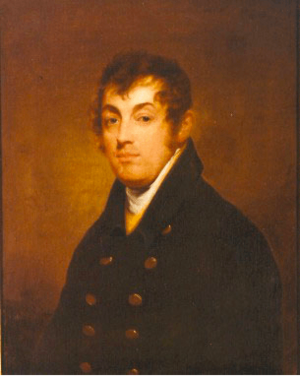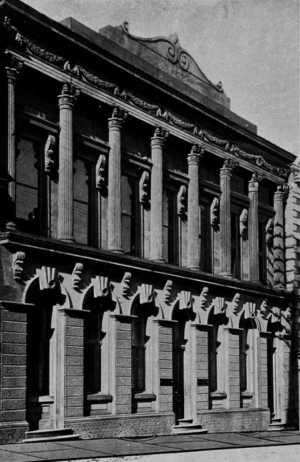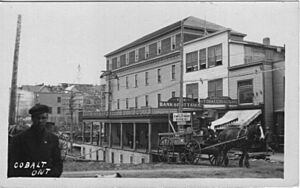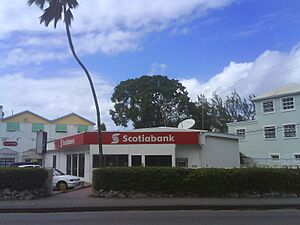Scotiabank facts for kids
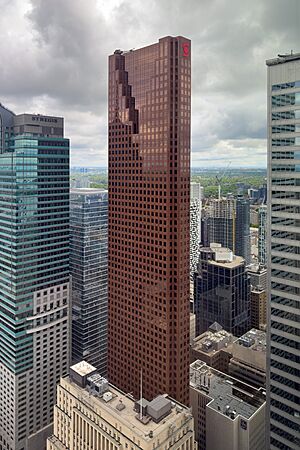
Scotia Plaza in Toronto
|
|
|
Trade name
|
Scotiabank |
|---|---|
| Public | |
| Traded as | TSX: BNS NYSE: BNS S&P/TSX 60 component |
| Industry | |
| Founded | March 30, 1832 Halifax, Nova Scotia |
| Headquarters | Scotiabank North, 40 Temperance Street, Toronto, Ontario, Canada |
|
Key people
|
|
| Products |
|
| Revenue | |
| AUM | |
| Total assets | |
| Total equity | |
|
Number of employees
|
88,488 (2024) |
| Subsidiaries | Tangerine Bank |
Scotiabank, also known as the Bank of Nova Scotia, is a big Canadian bank. Its main office is in Toronto, Ontario. It is one of Canada's five largest banks. It is also the third biggest Canadian bank based on customer deposits and its total value.
In 2023, Forbes magazine ranked Scotiabank as the 88th largest company in the world. Scotiabank helps over 25 million customers around the world. It offers services like personal banking, business banking, and managing investments.
The bank has more than 89,000 employees. As of April 30, 2024, it had assets worth CA$1,399 billion. Scotiabank's shares are traded on the Toronto and New York stock exchanges.
Scotiabank started in 1832 in Halifax, Nova Scotia. Its main office moved to Toronto in 1900. Scotiabank calls itself "Canada's most international bank." This is because it has bought many banks in Latin America and the Caribbean. It also has operations in Europe and parts of Asia.
Contents
History of Scotiabank
How Scotiabank Started (1832–1900)
The Bank of Nova Scotia was created in 1832 in Halifax, Nova Scotia. At that time, Nova Scotia was a British colony. The government of Nova Scotia officially approved the bank on March 30, 1832. William Lawson was the bank's first president. The bank's goal was to help with trade across the Atlantic Ocean.
In 1883, the Bank of Nova Scotia bought the Union Bank of Prince Edward Island. However, most of its growth in the 1800s came from opening new branches. The bank started its branch system by opening an office in Windsor, Nova Scotia.
At first, the bank only expanded within the Maritimes region of Canada. In 1882, it opened a branch in Winnipeg, moving west. This branch later closed, but the bank continued to grow into the American Midwest. It opened a branch in Minneapolis in 1885, which later moved to Chicago in 1892. After two banks in Newfoundland failed in 1894, the Bank of Nova Scotia opened a branch there.
In 1889, the bank opened a branch in Kingston, Jamaica. This was to help with trading sugar, rum, and fish. This was Scotiabank's first step into the Caribbean. It was also the first time a Canadian bank opened a branch outside of the United States or the United Kingdom. By the end of the 1800s, Scotiabank had branches in all of the Maritimes, Quebec, Ontario, and Manitoba. In 1899, it opened a branch in Boston, Massachusetts.
Growing Bigger (1900–1960s)
In 1900, Scotiabank moved its main office to Toronto, Ontario. The bank kept growing by opening new branches in the early 1900s. In 1906, it opened a branch in Havana, Cuba. The next year, it opened one in Old City. In 1910, a branch opened in San Juan, Puerto Rico.
Scotiabank also grew by joining with or buying other banks. It merged with the Bank of New Brunswick in 1913. In 1914, it bought the Metropolitan Bank from Toronto. This made Scotiabank the fourth largest bank in Canada at that time. In 1919, it joined with the Bank of Ottawa.
In 1919, the bank opened a branch in Fajardo, Puerto Rico. The next year, it opened offices in London and Santo Domingo, Dominican Republic. By 1931, Scotiabank had five branches in Havana, Cuba, and one each in Camagüey, Cienfuegos, Manzanillo, and Santiago de Cuba.
In the mid-1900s, the bank offered more types of products and services. For example, in 1954, it started a mortgage department to help people buy homes. In 1958, it began offering consumer credit programs.
Scotiabank's branches in Cuba operated until 1960. Then, the Cuban government took control of all banks in Cuba. Scotiabank stopped its services there. In the 1960s, Scotiabank was the first Canadian bank to have women as bank managers. The first woman manager was appointed on September 11, 1961. In 1962, the bank expanded into Asia by opening an office in Japan.
Becoming More International (1970s–1990s)
In 1975, the Bank of Nova Scotia started using "Scotiabank" as its main name around the world. In 1978, Scotiabank became the first Canadian bank to sign an agreement with a union.
In 1986, Scotiabank created Scotia Securities. This new company offered services for buying and selling stocks. In the late 1980s and 1990s, the bank bought several other companies. These included the McLeod Young Weir brokerage firm in 1988 and Montreal Trustco Inc. in 1994.
Recent History (1997–Present)
In 1997, Scotiabank bought National Trust Company for CA$1.25 billion. In the same year, it also bought Banco Quilmes in Argentina.
In 2000, Scotiabank increased its ownership in the Mexican bank Grupo Financiero Inverlat to 55 percent. This Mexican bank was then renamed Grupo Financiero Scotiabank Inverlat. Scotiabank later fully took over Inverlat in 2003, gaining many branches in Mexico.
In 2002, Scotiabank closed its branches in Argentina due to a financial crisis there. In 2003, Scotiabank's branch in Guangzhou, China, was the first Canadian bank to get a license to deal in Chinese money. In 2007, Scotiabank bought a 24.98 percent share in Thanachart Bank in Thailand. This share grew to 48.99 percent by December 2014. Thanachart Bank is now the 6th largest bank in Thailand.
In 2010, the bank opened its first offices in Bogotá, Colombia. In 2011, Scotiabank bought a 51 percent share in Colpatria, Colombia's fifth largest bank. This was a big international purchase for a Canadian bank.
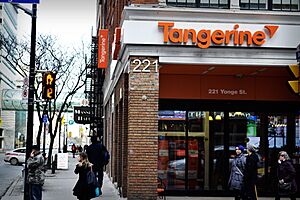
In 2012, Scotiabank agreed to buy ING Direct Bank of Canada. The sale was completed on November 15, 2012, for CA$3.13 billion. ING Bank of Canada was later renamed Tangerine in April 2014.
In 2015, Scotiabank announced it would buy Citigroup's banking operations in Panama and Costa Rica. This purchase increased Scotiabank's customer base in those countries.
Cedric Ritchie, a former president and CEO of Scotiabank, passed away on March 20, 2016. He led the bank from 1972 to 1995. Under his leadership, Scotiabank expanded into over 40 countries.
In 2017, Scotiabank joined the Enterprise Ethereum Alliance, which works with blockchain technology. In 2018, Scotiabank bought the Montreal investment firm Jarislowsky Fraser. Also in 2018, Scotiabank bought a large share of BBVA Chile, a bank in Chile. BBVA Chile then merged into Scotiabank Chile.
In February 2019, authorities in Costa Rica visited Scotiabank's offices. They were looking for information about accounts that might be linked to money laundering. Later in June 2019, Scotiabank announced it would sell all its branches in Puerto Rico and the U.S. Virgin Islands.
In 2019, Scotiabank updated its brand. It changed its logo and started using a new font. The company also began using the shorter name "Scotia" more often.
In February 2024, Scotiabank announced it was helping create the first investment dealer in Canada owned by Indigenous people. This new company, Cedar Leaf Capital, is a partnership between Indigenous groups and Scotiabank. It aims to help Indigenous people access investments and develop infrastructure.
In August 2024, Scotiabank announced it was buying a 14.9% share of KeyCorp, a U.S. bank, for about $2.8 billion. This deal was expected to be completed in early 2025. The two banks plan to work together to serve their customers.
In November 2024, some Scotiabank customers had trouble accessing their accounts for several days.
In January 2025, Scotiabank announced an agreement to buy the remaining shares (43.9%) in Scotiabank Colpatria in Colombia. They also announced a merger agreement in some Latin American countries. Through this, Scotiabank will own 20% of Davivienda, and Davivienda will take over Scotiabank's operations in Colombia, Panama, and Costa Rica. These changes are subject to government approvals in 2025.
In June 2025, Scotiabank appointed Alton McDowell as its Global Head of Corporate Banking.
Acquisitions and Mergers
Scotiabank has joined with or bought many other banks over the years. Most of these banks have been renamed Scotiabank. However, some still use their old names. For example, some branches of Montreal Trust and National Trust are now called Scotiabank & Trust.
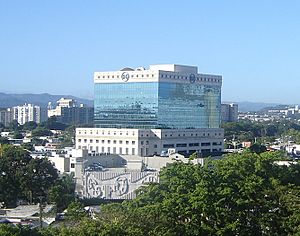
| Bank | Year established | Year of amalgamation |
|---|---|---|
| 1860 | 1883 | |
| 1866 | 1901 | |
| 1820 | 1913 | |
| 1902 | 1914 | |
| 1874 | 1919 | |
| 1889 | 1994 | |
| 1898 | 1997 | |
| 1684 | 1997, Scotiabank acquires Mocatta Bullion from Standard Chartered | |
| 1991 | 1992, Scotiabank acquires 5% stake | |
| 1982 | 2005 | |
| 1920 | 2006 | |
| 1986 | 2003 | |
| 1991 | 1997, Scotiabank acquires 25% of Peru's Banco Sudamericano | |
| 1982 | 2008 | |
| 1998 | 2010 | |
| 1966 | 2010 | |
| 2003 | 2011 | |
| 1997 | 2012, rebranded to Tangerine in 2013 | |
| 1955 | 2012, Scotiabank acquires 51% of the stakes in Banco Colpatria | |
| 2015, Scotiabank acquires Discount Bank Uruguay | ||
| 2003 | 2014, Scotiabank acquires 20% stake | |
| 1955 | 2018 | |
| 1957 | 2018 | |
| 1883 | 2018, Scotiabank acquires 68.19% stake | |
| 1972 | 2025, Scotiabank acquires 20% of the stakes in Banco Davivienda, Davivienda absorb Scotiabank operations in Colombia, Panama and Costa Rica |
How Scotiabank Works
Scotiabank has four main parts that handle different types of banking:
- Canadian Banking provides financial advice and banking services to people and businesses across Canada. Scotiabank also offers online banking through Tangerine Bank.
- International Banking offers financial products and advice to customers in certain regions outside of Canada. This includes services from Global Banking & Markets and Global Wealth & Insurance.
- Global Wealth & Insurance (GWI) combines the bank's wealth management and insurance services in Canada and other countries. It also includes Global Transaction Banking.
- Global Banking & Markets is Scotiabank's part that works with large companies, governments, and big investors around the world. It offers many different products and services.
Where Scotiabank Has Branches
In Canada
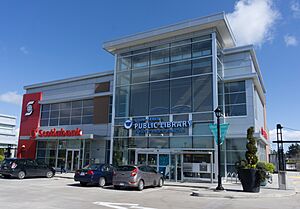
Scotiabank has branches in all Canadian provinces and territories, except for Nunavut.
Around the World
 Aruba
Aruba Australia
Australia Bahamas
Bahamas Barbados
Barbados Brazil
Brazil Cayman Islands
Cayman Islands Chile
Chile China
China Colombia
Colombia Costa Rica
Costa Rica Cuba
Cuba Curaçao
Curaçao Dominican Republic
Dominican Republic Egypt
Egypt France
France Guyana
Guyana Hong Kong
Hong Kong India
India Ireland
Ireland Jamaica
Jamaica South Korea
South Korea Luxembourg
Luxembourg Malaysia
Malaysia Mexico
Mexico Netherlands
Netherlands Panama
Panama Peru
Peru Russia
Russia Sint Eustatius
Sint Eustatius Singapore
Singapore Taiwan
Taiwan Thailand
Thailand Trinidad and Tobago
Trinidad and Tobago Turkey
Turkey Turks and Caicos Islands
Turks and Caicos Islands United Kingdom
United Kingdom Uruguay
Uruguay United Arab Emirates
United Arab Emirates Venezuela
Venezuela Vietnam
Vietnam
Sponsorships
Scotiabank supports many sports and cultural events.
Sports Sponsorships
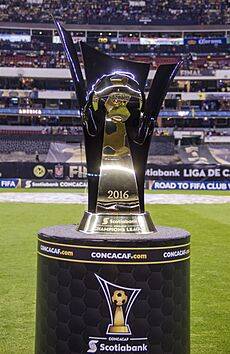
Scotiabank is the main sponsor for several sports events. These include the Calgary Marathon and the CONCACAF Champions League soccer tournament (since 2015). They also sponsor running events like the Scotiabank Toronto Waterfront Marathon. Since 2005, Scotiabank has sponsored the semi-final and conference final games of the CFL playoffs. They are also the official financial services provider for the Canadian Football League.
Scotiabank also sponsors sports leagues and teams. It became a sponsor for Club Deportivo Guadalajara (a soccer team) in 2013. In 2014, it became the official sponsor for the Chilean Primera División (a soccer league). Scotiabank is also the official bank of the National Hockey League (NHL) and the NHL Players' Association. Since 2008, Scotiabank has been the official team sponsor of the Canadian cricket Team. They are also the official bank of the West Indies cricket team.

Scotiabank also sponsors the names of several sports buildings. These include the Scotiabank Aquatics Center in Mexico and the Scotiabank Saddledome in Calgary (since 2010). It also sponsors the Scotiabank Centre in Halifax (since 2014). On August 29, 2017, Scotiabank bought the naming rights for the Air Canada Centre in Toronto. This was a very large deal. The building was renamed Scotiabank Arena on July 1, 2018. From 2006 to 2013, Scotiabank also had the naming rights for the arena of the Ottawa Senators hockey team, calling it Scotiabank Place.
Culture Sponsorships
Scotiabank has also sponsored many cultural events and places in Canada. In 2005, Scotiabank became the main sponsor of the Giller Prize, a literary award. From 2006 to 2015, Scotiabank sponsored the Nuit Blanche art event in Toronto. In 2008, Scotiabank started sponsoring Toronto's Caribana festival, which was renamed Scotiabank Caribbean Carnival Toronto.
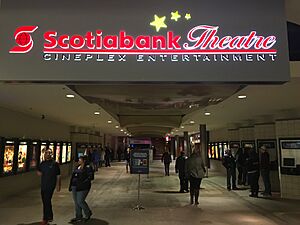
Scotiabank and Cineplex Entertainment (a Canadian movie theatre company) created a rewards program called Scene+ in 2007. This program lets moviegoers earn points for free movies or discounts. Scotiabank customers can also get special debit and credit cards that earn Scene+ points. Five Cineplex Entertainment movie theatres were also renamed "Scotiabank Theatres." In 2015, they expanded this to include five more theatres. On December 14, 2021, the new Scene+ program was launched, combining Scene and Scotia Rewards points.
Scotiabank also sponsors two university buildings in Canada: Scotiabank Hall at Brock University and Scotiabank Hall at Dalhousie University.
Awards and Recognition
Scotiabank has received many awards over the years for its banking services.
- 2005 – Named "Bank of the Year" for Mexico, the Caribbean, and Jamaica by LatinFinance.
- 2007 – The Banker magazine named Scotiabank Trinidad and Tobago, Scotiabank Belize, and Scotiabank Turks and Caicos as "Bank of the Year."
- 2008 – The Banker recognized Scotiabank Barbados, Scotiabank Trinidad and Tobago, Scotiabank Guyana, and Scotiabank Turks and Caicos.
- 2009 – The Banker named Scotiabank Canada, Scotiabank Barbados, Scotiabank Dominican Republic, Scotiabank Trinidad and Tobago, and Scotiabank Turks and Caicos as "Bank of the Year."
- 2010 – The Banker recognized Scotiabank Barbados, Scotiabank Trinidad and Tobago, and Scotiabank Turks and Caicos.
- 2011 – Global Finance Magazine named Scotiabank Jamaica, Scotiabank Barbados, Scotiabank Costa Rica, and Scotiabank Turks and Caicos as "Best Emerging Market Bank."
- 2012 – The Banker named Scotiabank "Global Bank of the Year" and "Bank of the Year" for the Americas, Antigua, Barbados, Belize, British Virgin Islands, Canada, and Turks and Caicos.
- 2013 – The Banker named Scotiabank "Bank of the Year" in British Virgin Islands, Canada, Guyana, Jamaica, and Trinidad and Tobago.
- 2014 – Global Finance Magazine named Scotiabank "Best Emerging Market Bank in Latin America" in Jamaica, Barbados, Trinidad & Tobago, Turks and Caicos, and U.S. Virgin Islands.
Memberships
Scotiabank is a member of the Canadian Bankers Association (CBA). It is also a registered member of the Canada Deposit Insurance Corporation (CDIC). The CDIC is a government agency that protects deposits in Canadian banks.
Scotiabank is part of the Global ATM Alliance. This is a group of major international banks. It allows customers to use their ATM cards at other banks in the alliance without extra fees when traveling. Other banks in this group include Barclays (UK), Bank of America (US), BNP Paribas (France), Deutsche Bank (Germany), and Westpac (Australia and New Zealand).
Scotiabank is also a member of other international groups, including:
- Amex (in Canadian markets)
- CarIFS ATM Network
- Global ATM Alliance
- Interac
- MAGNA Rewards
- MasterCard (in Caribbean markets)
- MultiLink Network ATM network
- NYCE ATM Network
- Plus Network (for VISA card users)
- VISA International
- UNEPFI (part of the Net Zero Banking Alliance)
Leadership at Scotiabank
Here are some of the people who have led Scotiabank over the years:
Presidents
- William Lawson, 1832–1837
- Mather Byles Almon, 1837–1870
- James Donaldson, 1870–1871
- John Doull, 1871–1872
- Andrew Mitchell Uniacke, 1872–1874
- John S. Maclean, 1874–1889
- John Doull, 1889–1899
- Jarius Hart, 1899
- John Young Payzant, 1899–1918
- Charles Archibald, 1918–1923
- George Stewart Campbell, 1923–1927
- Samuel John Moore, 1927–1934
- John Andrew McLeod, 1934–1945
- Herbert Deschamps Burns, 1945–1949
- Horace Luttrell Enman, 1949–1956
- Charles Sydney Frost, 1956–1958
- Frank William Nicks, 1958–1970
- Arthur Holmes Crockett, 1970–1972
- Cedric Elmer Ritchie, 1972–1979
- John Alexander Gordon Bell, 1979–1992
- Peter Cowperthwaite Godsoe, 1992–2003
- Richard Earl Waugh, 2003–2013
- Brian Johnston Porter, 2013–2022
- Lawren Scott Thomson, 2022–
Chairmen of the Board
- Samuel John Moore, 1933–1945
- John Andrew McLeod, 1945–1946
- Herbert Deschamps Burns, 1949–1955
- Horace Luttrell Enman, 1955–1959
- Frank William Nicks, 1962–1972
- Thomas Albert Boyles, 1972–1974
- Cedric Elmer Ritchie, 1974–1995
- Peter Cowperthwaite Godsoe, 1995–2004
- Arthur Richard Andrew Scace, 2004–2009
- John Thomas Mayberry, 2009–2014
- Thomas Charles O'Neill, 2014–2019
- Aaron William Regent, 2019–
Chief Executive Officers
- Frank William Nicks, December 1958 – January 4, 1972
- Thomas Albert Boyles, January 4, 1972 – December 1972
- Cedric Elmer Ritchie, December 1972 – January 19, 1993
- Peter Cowperthwaite Godsoe, January 19, 1993 – December 1, 2003
- Richard Earl Waugh, December 2, 2003 – October 31, 2013
- Brian Johnston Porter, November 1, 2013 – January 31, 2023
- Lawren Scott Thomson, February 1, 2023 –
See also
 In Spanish: Scotiabank para niños
In Spanish: Scotiabank para niños
- Big Five banks of Canada
- List of largest banks
- List of banks and credit unions in Canada
- List of banks in the Americas
- Scotia
- Scotia Place
- Scotia Plaza
- ScotiaLife Financial
- Scottish-Canadian
- Scotiabank Arena
- Scotiabank Centre
- Scotiabank Saddledome
- John P. Webster
 | Kyle Baker |
 | Joseph Yoakum |
 | Laura Wheeler Waring |
 | Henry Ossawa Tanner |


